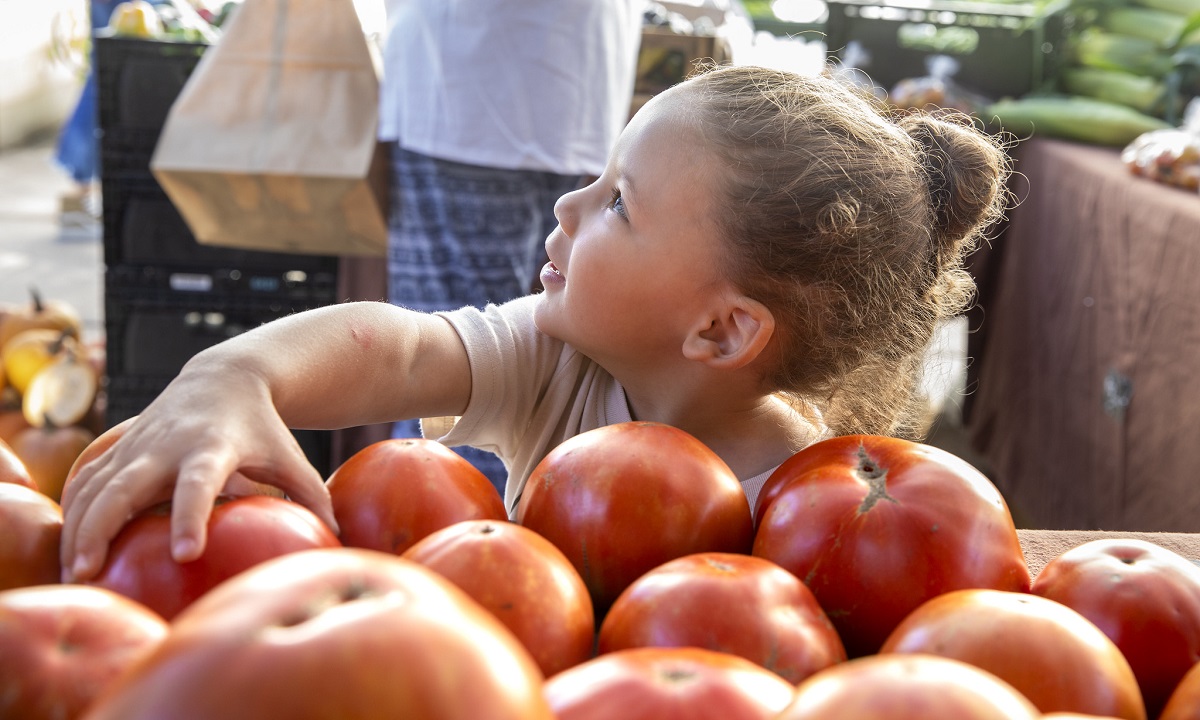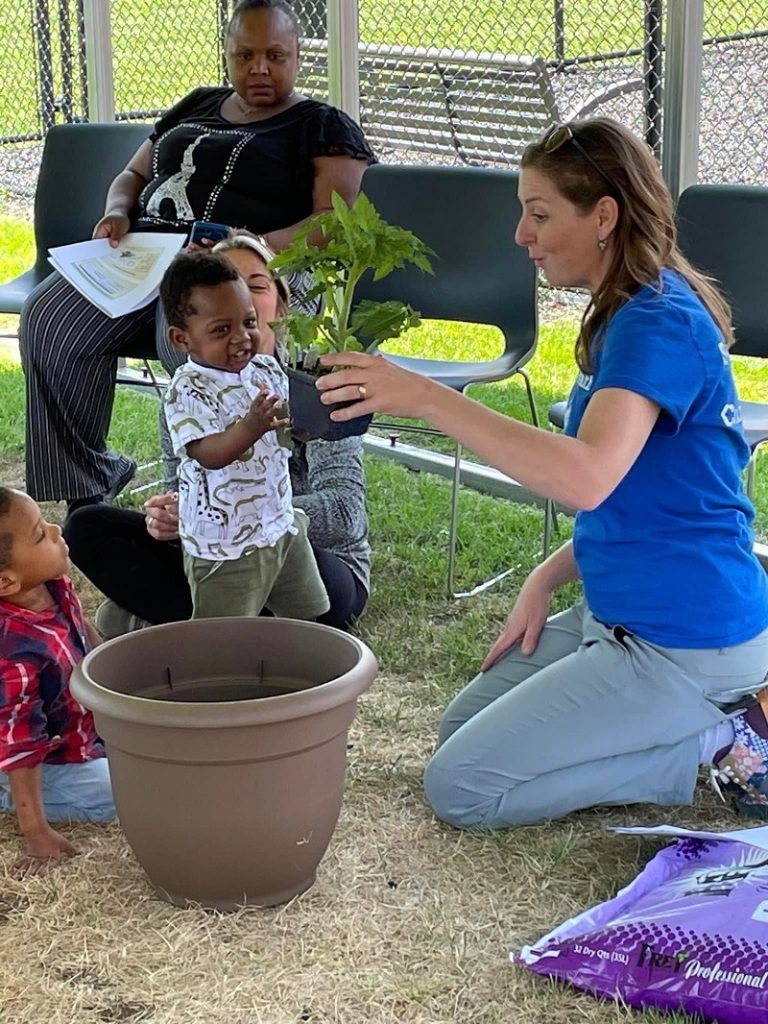Ultimate grassroots: Penn State Health community garden program fights food insecurity in central Pennsylvania

Patrons can walk into the Northern Dauphin Public Library on Main Street in Lykens and borrow a tomato.
More precisely, they can check out a packet of seeds. If they follow the instructions that come with one of the little rattling envelopes on a cart near the front entrance or the advice of gardening experts who visit the library regularly to give workshops, the seeds will grow into a tomato plant. Or a cucumber. Or a carrot. Or one of the cornucopia of healthy vegetables the library keeps in circulation.
The idea is visitors will grow their own plants, eat the veggies and then return some of the seeds – though there’s no fine for failing to bring back by a specified due date a handful to replace what they took.
The seed library is the brainchild of librarian Lizzy Baldwin and just a small part of a growing Penn State Health community program that’s the very definition of the word “grassroots.”
Walk through the back doors of the library and you’ll see another. Past a courtyard backdropped by rolling central Pennsylvania countryside are what look like nine metal bathtubs arranged in the shape of the star the library uses in the logo near the front door. Each tub is filled with potting soil. After installing them in April, gardeners from the library and Penn State Health filled each planter with lettuce, broccoli, peppers, cucumbers, lavender, mint, basil and other odds and ends that will leaf out by summer.
Picturesque, definitely. Fun, for sure. But the Lykens library garden and 15 others that Penn State Health has helped plant throughout six counties in central Pennsylvania mean so much more.
“It’s an expansion of food access,” said Ashley Visco, Penn State Health community health director. “There’s so much food insecurity in our communities, and it can’t be solved with a charitable food network alone.”
The health system is aided by a grant from Rite Aid Healthy Futures, a public charity that distributes funds to alleviate health disparities in underserved areas. Penn State Health is using a portion to establish new gardens and expand existing ones in yards behind small town libraries or near Salvation Army campuses in communities like Harrisburg, Steelton and Millersburg.
Oases in a food desert
The Lykens garden’s produce helps supplement supplies at the Upper Dauphin Human Services Center, which is located a few yards away. But it also gives the residents a stake in their access to healthy food by encouraging them to start their own potted-plant gardens.
The gardens play a role in existing efforts to get fruits and vegetables onto the dinner tables of families who need them. In Lykens, residents aren’t immune to the ravages of what community health experts call “food insecurity.” In Dauphin County, 13.5% of respondents to the Six-County Community Health Needs Assessment Report said they were worried about having enough food for their next meal. The assessment is completed every three years by non-profit hospitals to identify key health needs in a defined community. Penn State Health completed its most recent assessment in 2021.
Much of the problem stems from living in food deserts – areas where access to adequate, healthy sustenance is as rare as fresh water in the Sahara. They exist in dozens of central Pennsylvania communities. They can form anywhere, from urban centers like the brick and concrete streetscapes that ring the Chestnut Street Community Center in downtown Lebanon to bucolic settings like Lykens.
Now, in a growing number of them, you’ll find sprouting and ─ urged on by people Penn State Health T-shirts ─ tiny, blooming oases of hope. These are the community gardens.
From ground to mouth
Early one evening in May, Dr. Terrah Keck-Kester, an integrative medicine pediatrician at Penn State Health Children’s Hospital, clad in a blue Penn State Health T-shirt, strolled past the Northern Dauphin Library shelves and out into the garden. Visco and project manager Laurie Crawford had arrived moments earlier in Crawford’s van, and Keck-Kester joined them as they stacked bags of potting soil at the edge of the garden, along with pots, metal cages and bags of fertilizer.
The three women are a contingent from Penn State Health’s Garden Team, which partners with other local groups to build new gardens or fund and expand supercharge existing ones in key areas served by the health system.
For Keck-Kester, the effort checks many boxes. She regularly sees the damage food insecurity causes her patients. Those affected by limited access to healthy fruits and vegetables suffer from obesity, hypertension and mental health disorders.
Produce from food pantries helps fill many of the gaps, but the hope is the community gardens will offer more than just a few greens.
“We know that the more vegetables you eat and the closer they are to when they come out of the ground to when they go into your mouth the healthier they tend to be,” she said. “There’s also great evidence now of the mental health benefits of gardening and being out in nature.”
From country to city
In Lykens, nature doesn’t seem in short supply as the women work. Thirty miles south, the garden at Chestnut Street Community Center brings some of the countryside to an urban center: vegetables in raised beds and a weekly farm stand in the middle of Lebanon, a city of nearly 27,000 people crammed into slightly more than five square miles.
Until April 2022, the community garden was a cement courtyard bracketed by boxwoods across from Harding Elementary School. Using the same grant from Rite Aid, Penn State Health’s garden team and others ripped out the landscaping and added the raised beds, which grow tomatoes and other veggies.
Laurie Funk, who founded the center in 2021 as a homeless shelter, envisioned using the courtyard as a community space. The garden was a first step.
The garden team quickly realized the need for vegetables was more dire than they could handle with just the raised beds alone.
“It really is a food desert here,” Crawford said. “They don’t have any fresh produce.” Nearly all options are outside Lebanon’s city limits ― several minutes by a car, which many residents don’t own.
So, the garden team eventually partnered with local farmers and offered them space to sell vegetables. Now, passersby drop in to choose from the heaps of green peppers, lettuce, onions and cucumbers. Other health-related initiatives sometimes join in. For example, a Penn State Health nurse periodically provides blood pressure screenings at a table and offers brochures.
“It’s a perfect location,” Crawford said. “It’s right downtown, so that’s why we picked it, and the hope is that the Chestnut Street Community Center will grow and the market and the resources here will continue to grow as well. But it’s all because of the garden. The garden was first.”
From city to country
In Lykens, transportation is also an issue. Some residents live on country roads, miles from any town center. The nearest grocery store is a long drive by car and impossible by foot.
That’s what’s brought the garden team to Lykens that evening in early May. In addition to offering vegetables, Crawford and the others came to teach residents how to grow their own. At some of the other gardens, dozens of local residents have attended their seminars.
Linda Evans went to the seminar at Lykens that night. Evans lives in an apartment building in Elizabethville, about seven miles west of Lykens, and has access to a flower garden, but it just won’t work for planting vegetables in the ground. A potted plant garden sounded like exactly what she needed.
Crawford taught her everything from basics, like “the ground is full of worms and micronutrients,” to insider dirt even members of the garden team didn’t know, like, “don’t water the leaves of what you’re planting, but water the roots.”
“Hey, want a tomato plant?” Crawford hollered to a couple ambling past with a dog. The couple smiled and waved, but continued past without stopping.
Her lesson includes a free tomato plant, soil, fertilizer, gloves and a metal cage. Crawford showed Evans how to punch holes in the bottom of the plastic pot – first making sure that everything is properly sterilized to keep it free from blight — fill it with topsoil and drop in her plant.
“Hey,” Crawford yelled to a man riding past on a bicycle, “we’re planting tomato plants. Want one?”
“Why not?” the man yelled back. He joined the cluster behind the library working the black soil from the plastic bags.
Evans needed all the help she could get. She tried planting a few veggies in a greenhouse kit once before, but everything died. Her husband had owned the green thumb in her family. He used to plant everything from pumpkins to cucumbers, until he passed away last year.
She misses fresh vegetables. Sometimes, she drives a few miles to reach a farm stand in Gratz to get her hands on a fresh tomato, but a load of fresh veggies always seems out of the way.
Into the soil, Evans planted a small plastic sign. She wrote the word “TOMATO” on it with a magic marker. Then, she loaded it into her car, waved goodbye and drove away with her tomato from the library.
A place that had been established strictly for nourishment of the mind had helped with nourishment of a different kind.
“I will definitely be back,” she said.
Relief for families experiencing food insecurity and improving food access are part of the Penn State Health strategy to improve wellness and disease prevention. Learn more in the Penn State Health Community Health Needs Assessment and Implementation Plan.
Click the image below for a gallery of photos.
If you're having trouble accessing this content, or would like it in another format, please email Penn State Health Marketing & Communications.



